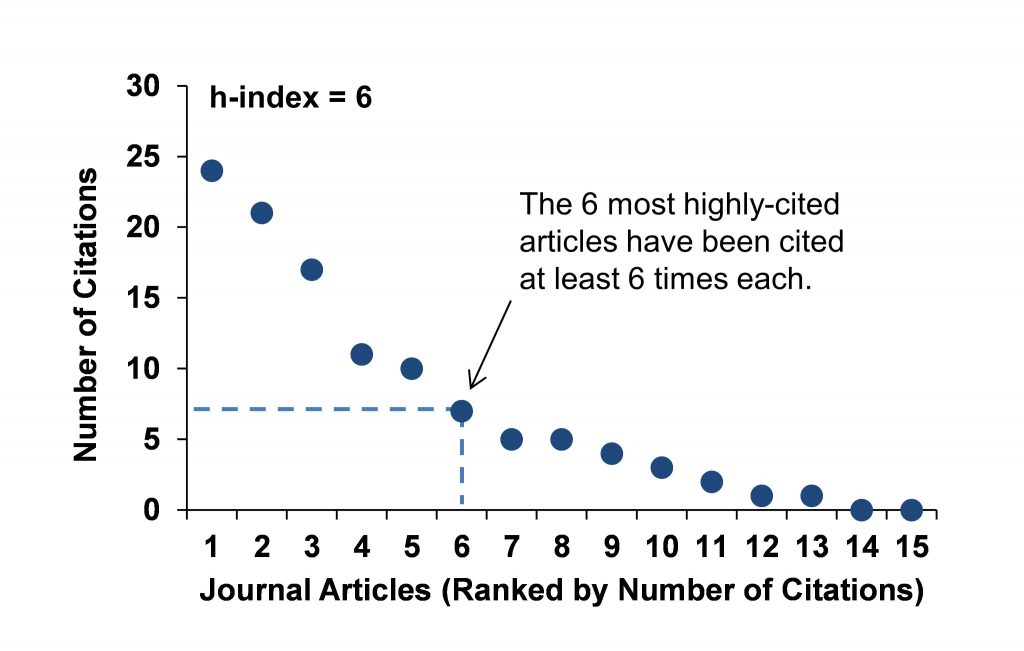The h-index measures a scientist’s productivity and overall impact. It is defined as the maximum number h such that h of a scientist’s Np papers have at least h citations each. In other words, a scientist with an h-index of 20 has at least 20 papers with at least 20 citations each.

In our previous post, we discussed what a good h-index. The h-index is often used as a way to assess the research productivity and impact of a scientist, and it is increasingly being used in hiring, promotion, and funding decisions.
Here are a few tips on how to improve your h-index:
- Publish high-quality research: This may seem obvious, but it is important to focus on producing high-quality research that is likely to be cited by others. This includes choosing research topics that are relevant and timely, and conducting your research in a both thorough and rigorous manner. It is of course also important to clearly communicate your findings in well-written papers that are easy for other people to understand and use as a resource for their own work.
- Choose the right journals: You need to choose the right journals for your research. You should aim to publish in journals that are well-respected in your field and that have a high impact factor (i.e. a measure of the average number of citations received by papers published in a particular journal). It is also a good idea to consider the specific audience you are trying to reach with your research, and choose a journal that is likely to be read by that specific audience.
- Promote your research: Once you have published your research, you then need to promote it in order to ensure that it is seen by as many people as possible. You can do this by presenting your research at conferences, sharing it on social media and your personal website, and making it available through open access repositories. You can also consider writing review articles or summarizing your research for a wider audience.
- Collaborate with other people: Collaborating with other researchers can help increase the impact of your research. By working with others, you can combine your expertise and resources to produce high-quality research that is more likely to be cited. Collaborating with other people from different institutions or countries can also help increase the visibility of your research and introduce you to new research communities.
- Stay up to date: It is important to stay up to date with the latest research in your field. This can help you identify new research opportunities and areas where you can make a unique contribution. It can also help you to stay current with the latest thinking in your field and ensure that your research is relevant and timely.
- Use bibliometric tools: There are a number of tools available that can help you track the impact of your research and identify areas for improvement. These tools can provide information on the number of citations your research has received, the journals in which it has been published, and the countries in which it has been cited. By using these tools, you can get a better understanding of the impact of your research and identify areas for improvement.
- Get feedback: It is important to seek feedback on your research from colleagues and peers. This can help you identify strengths and weaknesses in your research and identify areas for improvement. You can also consider seeking feedback from reviewers and editors when you are preparing your research for publication.
Improving your h-index is good, however…
While the h-index can be a useful tool for assessing the productivity and impact of a scientist, it is important to remember that it is just one measure and should not be the sole focus of a scientist’s work. There are many other factors that contribute to the impact of a scientist’s research, such as the quality of the research itself, the importance of the research to the field and society, and the ability to communicate the research effectively to a wider audience.
In addition, the h-index has limitations as a measure of impact. It does not take into account the different citation patterns across fields, and it does not distinguish between self-citations and citations from other researchers. As a result, the h-index may not accurately reflect the true impact of a scientist’s work in all cases.
It is also important to remember that the h-index is just one aspect of a scientist’s career. Other factors, such as teaching, mentoring, and service to the community, also contribute to a scientist’s overall impact and should not be overlooked.
In conclusion, while the h-index can be a useful tool for assessing the impact of a scientist’s research, it is important to remember that it is just one measure and should not be the sole focus of a scientist’s work. There are many other factors that contribute to the impact of a scientist’s research, and it is important to consider the full range of a scientist’s contributions to their field and society.
By following these tips, you can increase the impact of your research and improve your h-index. It is important to remember that improving your h-index is not the only goal of conducting research. You should also focus on conducting research that is meaningful and makes a positive contribution to your field and society. However, by following these tips, you can increase the chances that your research will be widely recognized and have a lasting impact.


